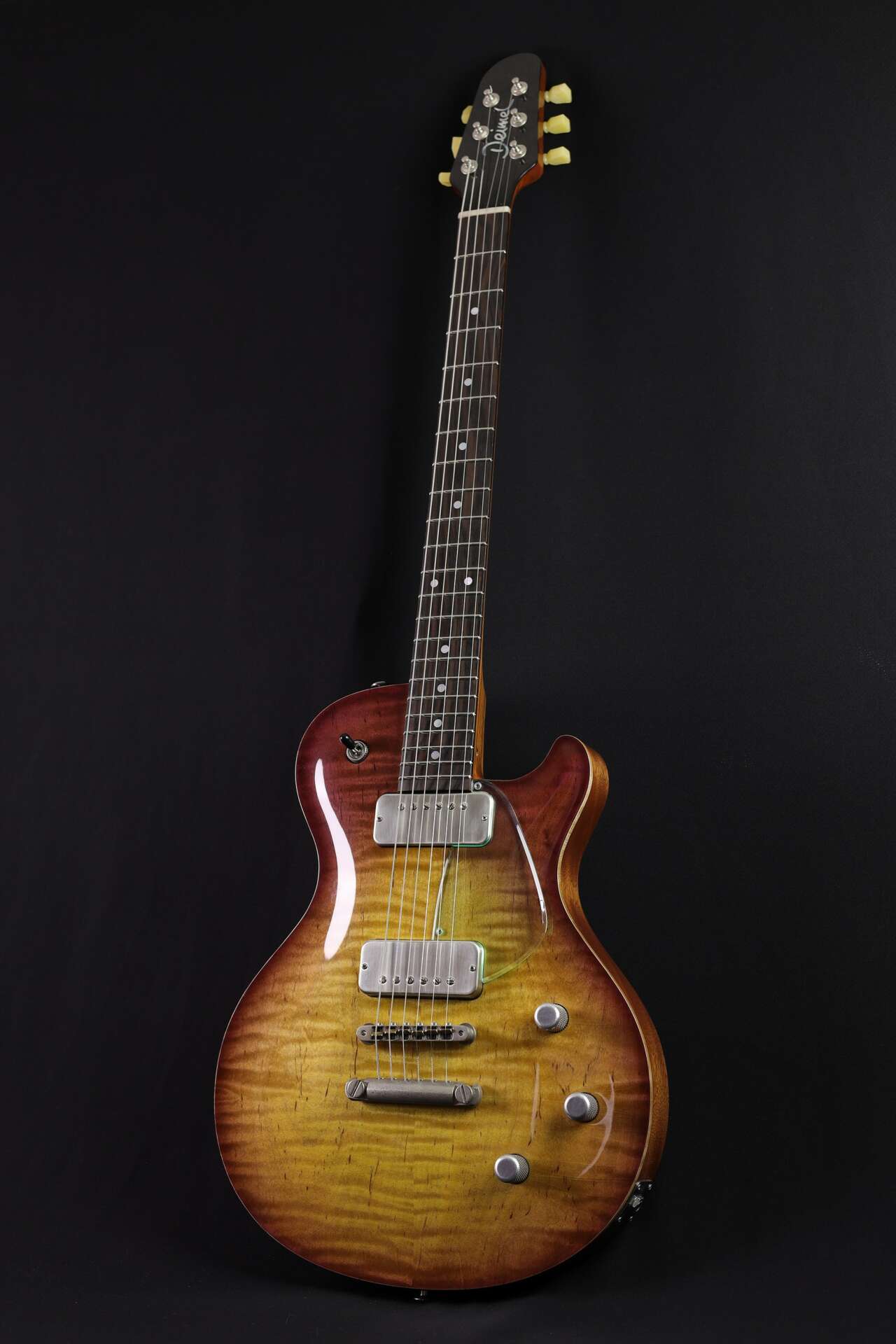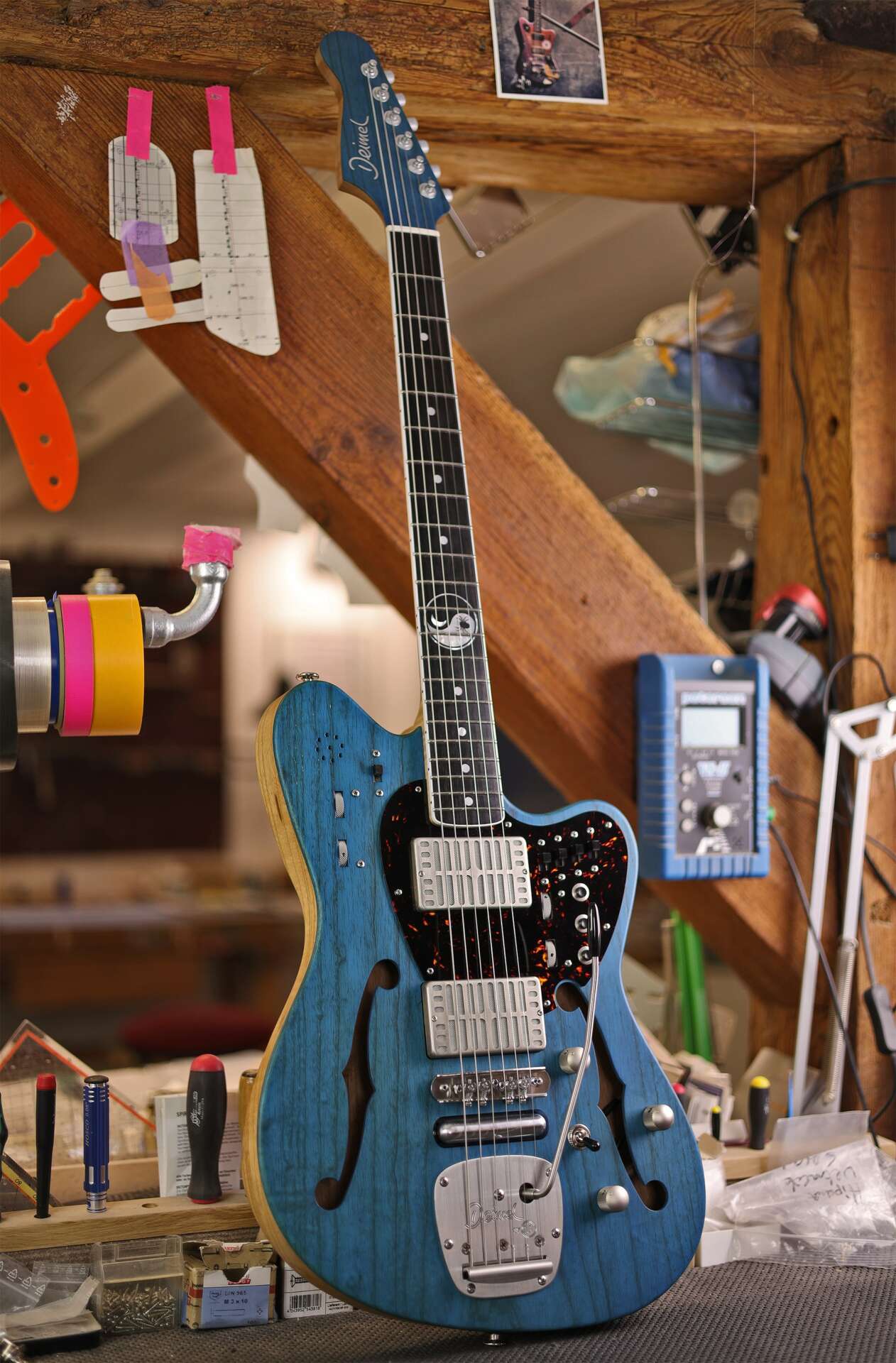We recently connected with Frank Deimel and have shared our conversation below.
Frank, thanks for taking the time to share your stories with us today Earning a full time living from one’s creative career can be incredibly difficult. Have you been able to do so and if so, can you share some of the key parts of your journey and any important advice or lessons that might help creatives who haven’t been able to yet?
It took me quite a while making a living with creating and establishing my own guitar line. Luckily repairing guitars was my earlier profession along with designing my first own line of guitars, and Berlin was so helpful as it had as many bands as bars almost in those years. But I never doubted to get there where I wanted as other luthiers on whose shoulders I stay, made it too. The first sales of guitars of course quickened up my believe in it, and as more and more musicians (and also better known ones) used my services or ordered a guitar, the more they brought in other customers too. It got around quickly. To be creative though and in the same time be business-orientated is an art form of its own, I have to say. We (me and my wife running the business now) had to learn and still am learning how to keep it well balanced. Still it is a daily adventure time and focus-wise, especially having a family. You hardly can be in the same time in the middle of a flow of ideas and start exploring them, and then do he bookkeeping or build up a sales strategy. As if 2 sides of the brain collide. But as practice shows we somehow are more and more able to manage it. From my personal experience this works best as a team. All in all it still is highly rewarding to get paid for creativity, as it is so meaningful in the end to create things other people adore and use it as their creative tool. Just wonderful!


Frank, before we move on to more of these sorts of questions, can you take some time to bring our readers up to speed on you and what you do?
I am a self-taught luthier of electric guitars and me and my wife Kora Junger who is a visual artist run a company called Deimel Guitarworks. My calling to work with guitars as a craft started in my early youth when I became interested in making things and the surrounding music scene I absorbed during my adolescence. After working in furniture restoration and studying industrial design and working at other guitar companies I finally founded my own guitar company in 1998 in Berlin.
From the beginning I focused on my individual shapes and solutions while learning a lot from vintage guitar repair and receiving feedback from active musicians during the Berlin period. Along with my wife’s amazing skills I created and envisioned a unique guitar line. We developed a combination of their unique features with the artwork of my wife, to also create limited editions with an even more unique character. We both are very proud of having found a niche inside the boutique guitar market this way, based on an aesthetic and meaningful design and useful technical improvements, to give the musician the temporary and aesthetic tool needed by today.
We have established a new offset shaped guitar outline, called the Firestar which is the basis of many variations we have made on custom order so far. From the beginning we wanted this guitar to be more versatile and with more different sounds right on the guitar, and therefore more inspiration. As out of my earliest love for the Les Paul Junior double-cut from 1959 (of which I am a proud owner) we also make interpretations of this very classic guitar style, called the Doublestar, and it’s sibling the Singlestar. The last addition to our line is the Bluestar, a semi-hollow offset with a more wider and shorter body outline compared to the slim Firestar shape.
As many iterations have been build of the Firestar in the recent past, we also received many custom requests based on this model. As we see our willingness and open mind in customer communication to be one of our core qualities, we have developed quite experimental versions of it, for instance the Fireschneider Experimental, or the LesLee Synchronizer.
Both include wildly expanded features as for instance closed chambers with piezo discs which can be filled with percussive little things to rattle inside, an onboard LesLee pickup system letting alternate the pickups, and a CV-controlled connection to sync to modular synthesizers. These guitars of course aim for the much more experimental, open minded musician, who often seeks more curious, timid textures or special string initiated noises. Many are doing score music or want to find new ways of expressing themselves on a guitar. This development gives us similar joy like the customer, as we can explore new territory yet unseen/unheard on this more than 80 year old electric guitar history.



What do you think is the goal or mission that drives your creative journey?
To me being a craftsperson working with my entire body and creating a real product gives me true joy and a meaningful life.
I have seen beautiful documentaries about the value of handcraft in the recent past, and there surely is a true renaissance of it like this hipster trend to again making it all by hand. It almost sounds like a cliché but indeed the actual doing of something with your own mind and hand, the muscle memory and the actual making of something is highly rewarding. It always has been, and it is a part of us. Think of sports or gardening, this is what makes your endorphines pop. A craftsperson has this daily, while making a living.
I think that despite the ongoing digitalization of our life with recent trends like AI, still nothing can compete with planning and executing a unique single piece which becomes a great object, something beautiful to look at and playing on it the same time. Wow! That to me is musical instrument building, and the particular goal I am thriving for is to make this work more visible, more valuable, and more accepted as what is is: true and temporary culture. We are working on our instruments with a meaning inside, which reflects everyone’s today life, our momentary temporary age. So there is always a recognizable meta level within, and that is actually a true historic value! Many of today’s products do not contain this meta level, they are simply resembling of an era in the past, or pretend to be something, because a marketing trend dictates it for a a couple of months. That is neither valuable, nor sustainable, in both ways, it rather becomes useless, meaningless, probably trash. So one goal should always be considered when developing something: how sustainable is it? For how long will it contain a value, does it contain a cultural meaning by mirroring the moments of life, is it probably recyclable to become something else after its purpose has been exceeded? I think these thoughts help making our product world better, and that’s what we want to inspire for.



Looking back, are there any resources you wish you knew about earlier in your creative journey?
Yes, there are so many good programs and people out there helping you business wise, and we just recently took advantage of a state program called „Creative Brandenburg“, the area we live in, Brandenburg, Germany. As a person focused on the inner qualities of my work, it would have been so great to have known in the past, there are these extremely supportive programs out there. We took help in time management, gained a deeper insight into social media strategies and have developed a new strategy to follow and promote our core qualities. So yes, take advantage! Look out for what is the most helpful advice in your individual situation or lack of competence and seek help. Making use of these consulting is probably taking years off of doing it by self experience. I truly wished for taking advantage earlier in my/our career. Strongly advisable!
Contact Info:
- Website: https://deimelguitarworks.com
- Instagram: https://www.instagram.com/deimelguitarworks/
- Facebook: https://www.facebook.com/DeimelGuitarworks
- Linkedin: https://www.linkedin.com/in/frankdeimel/
- Youtube: https://www.youtube.com/@deimelguitarworks
Image Credits
Astis Krause Frank Deimel


